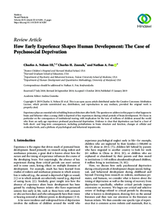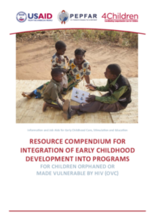Displaying 131 - 140 of 485
This exploratory study investigated kinship (e.g., relative) caregivers' (N = 130) perceived and actual knowledge associated with child trauma.
At a US House of Representatives Hearing on Migrant Family Separation Policy, Jack P. Shonkoff, M.D. (Director of the Center on the Developing Child at Harvard University) gave testimony on the impacts of family separation on children, highlighting the "strong scientific consensus supported by decades of peer-reviewed research" that "sudden, forcible separation of children from their parents is deeply traumatic for both the child and the parent," triggering "a massive biological stress response."
The purpose of this assessment is to reflect on the successes and challenges of the Global Alliance for Children (GAC) experience, a large-scale initiative to support and improve outcomes for children throughout their life cycle, especially children most at risk of harm.
The current study compared behavioral and adrenocortical functioning of maltreated and comparably aged (1.5–3 years) institutionally-reared children soon after (1.5–2.5 months) placement in foster care or adoptive homes, respectively.
The objective of this study was to test the associations between parent-child separation with telomere length (TL) and psychopathology during adolescence.
This article provides a review of indicators of child well-being in the six Gulf countries (Bahrain, Kuwait, Oman, Qatar, Saudi Arabia, and the United Arab Emirates), focusing on well-being in six domains: physical health, behavioral adjustment, psychological well-being, social relationships, safety, and cognitive well-being. The article highlights children's participation in decisions affecting their lives, relationships with parents and caregivers, and protection from abuse and neglect, among other indicators.
The question addressed in this paper from the Neural Plasticity journal is what happens to brain and behavior when a young child is deprived of key experiences during critical periods of brain development.
The current study examined longitudinal trajectories of memory and executive functioning (EF) from childhood to adolescence in the Bucharest Early Intervention Project, a randomized controlled trial of foster care for institutionally reared children in Romania.
This study used magnetic resonance imaging to compare adolescent AIDS orphans reared in institutions with a sex- and age-matched group of healthy adolescents reared in families in China using a voxel-based morphometry analysis.
Written for USAID and PEPFAR implementing partners, with a focus on OVC practitioners, this is a user-friendly compendium of current resources, information and job aids for early childhood care, stimulation and education.



